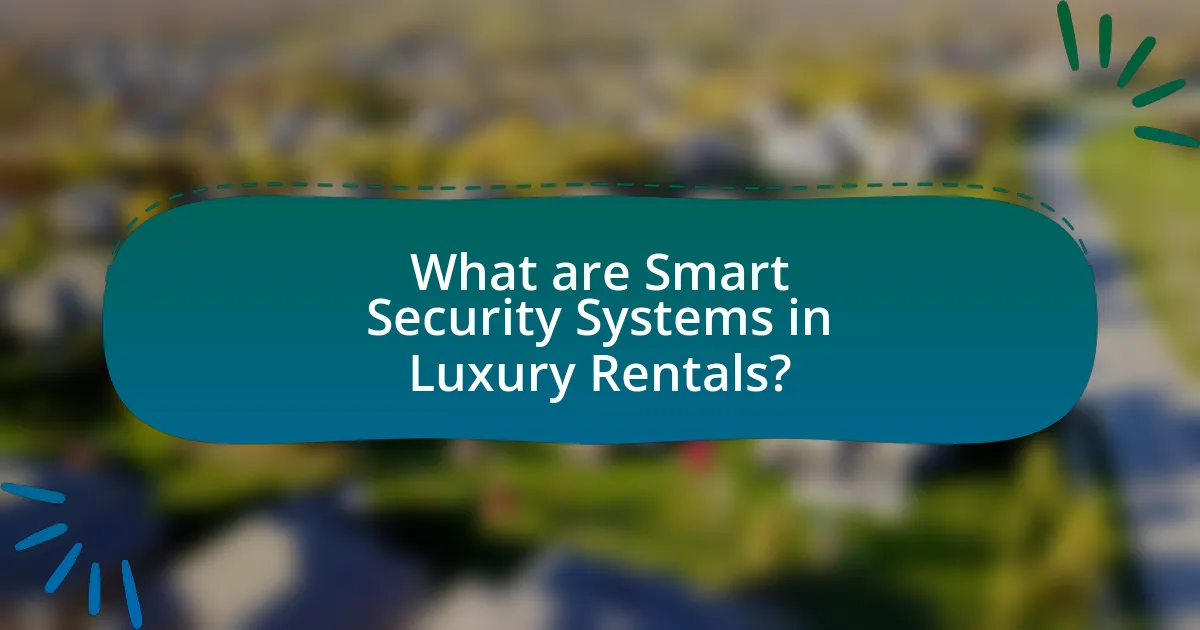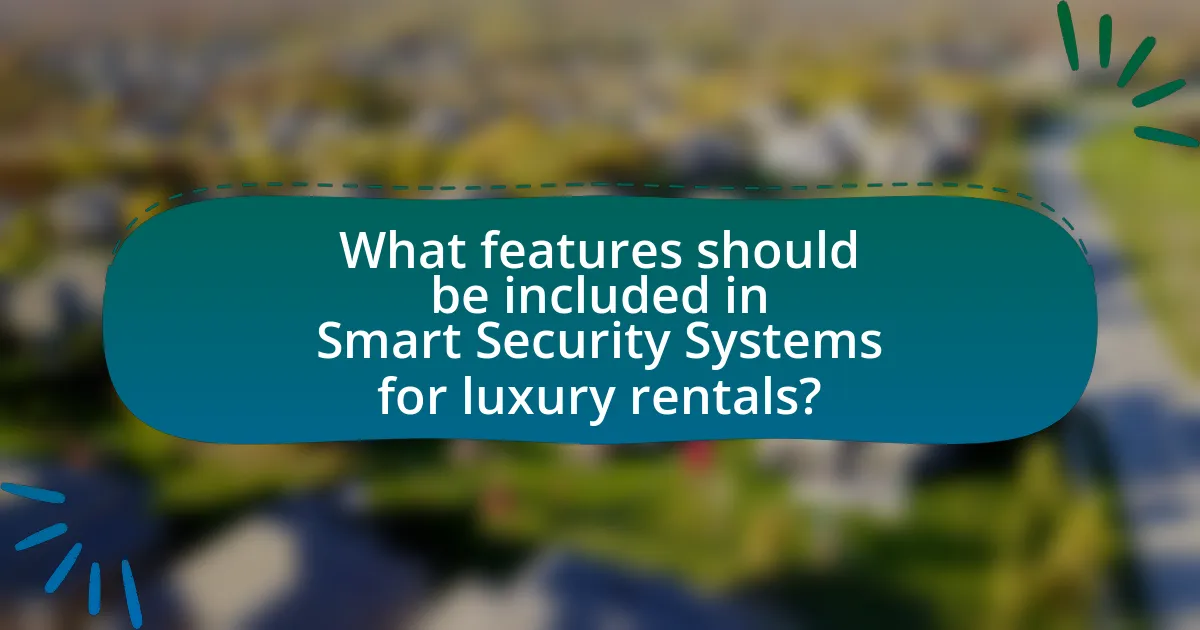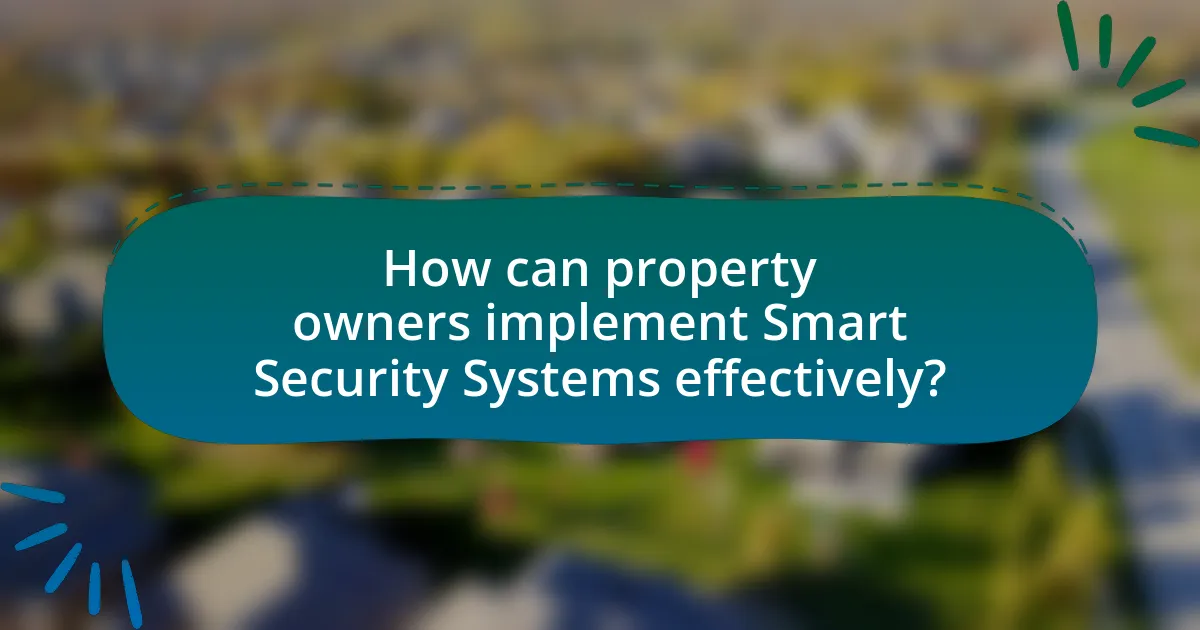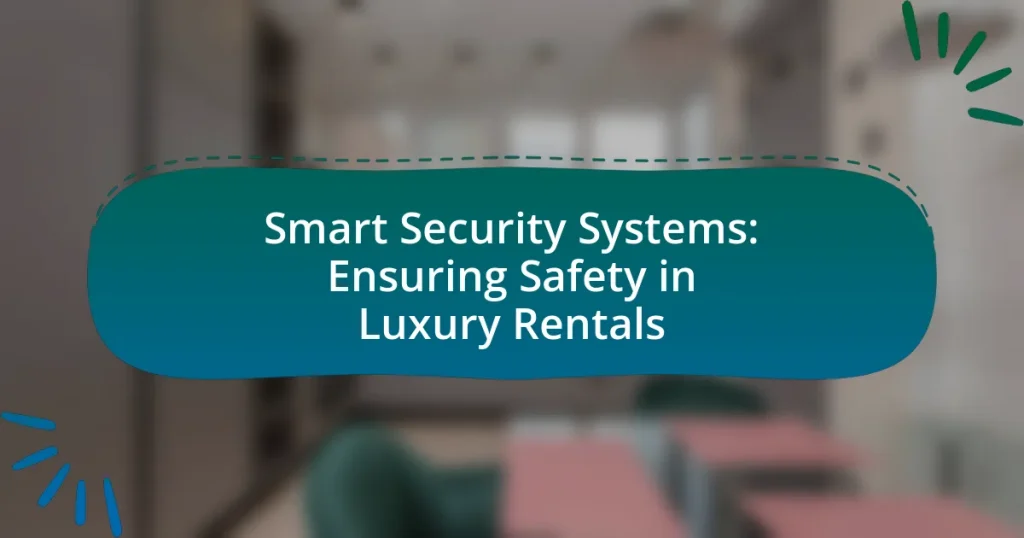Smart security systems in luxury rentals are advanced technological solutions that enhance safety and security for high-end properties. These systems incorporate features such as surveillance cameras, smart locks, motion detectors, and alarm systems, which can be monitored and controlled remotely. The article explores how these technologies work together to provide comprehensive security, the essential features for luxury rentals, and the risks associated with properties lacking such systems. Additionally, it discusses best practices for implementation, common challenges faced by property owners, and tips to enhance the effectiveness of smart security systems, highlighting their critical role in safeguarding valuable assets and ensuring peace of mind for both owners and tenants.

What are Smart Security Systems in Luxury Rentals?
Smart security systems in luxury rentals are advanced technological solutions designed to enhance safety and security for high-end properties. These systems typically include features such as surveillance cameras, smart locks, motion detectors, and alarm systems that can be monitored and controlled remotely via smartphones or other devices. The integration of these technologies allows property owners and tenants to maintain a high level of security, ensuring that unauthorized access is prevented and that any suspicious activity is promptly addressed. According to a report by MarketsandMarkets, the global smart security market is projected to grow significantly, indicating a rising trend in the adoption of such systems in luxury real estate.
How do Smart Security Systems enhance safety in luxury rentals?
Smart security systems enhance safety in luxury rentals by integrating advanced technologies such as surveillance cameras, motion detectors, and smart locks. These systems provide real-time monitoring and alerts, allowing property owners and tenants to respond quickly to potential threats. For instance, a study by the Electronic Security Association found that properties equipped with security systems are 300% less likely to be burglarized compared to those without. Additionally, features like remote access control enable owners to manage security settings from anywhere, further increasing safety measures.
What technologies are integrated into Smart Security Systems?
Smart Security Systems integrate various technologies including video surveillance, motion detection, access control, alarm systems, and smart home automation. Video surveillance utilizes high-definition cameras for real-time monitoring and recording, while motion detection employs sensors to identify unauthorized movements. Access control systems manage entry points through keycards or biometric authentication, enhancing security. Alarm systems provide alerts for breaches, and smart home automation allows remote management of security features via mobile applications. These technologies collectively enhance the safety and security of luxury rentals, ensuring a comprehensive protective environment.
How do these technologies work together to provide security?
Smart security systems integrate various technologies such as surveillance cameras, motion detectors, access control systems, and alarm systems to provide comprehensive security. Surveillance cameras monitor and record activities, while motion detectors identify unauthorized movements, triggering alerts. Access control systems manage entry points, ensuring only authorized individuals can access the premises. Alarm systems respond to breaches by notifying property owners and law enforcement. Together, these technologies create a layered security approach, enhancing overall safety in luxury rentals by deterring crime and enabling rapid response to incidents.
Why are Smart Security Systems essential for luxury rentals?
Smart security systems are essential for luxury rentals because they provide advanced protection and peace of mind for both property owners and guests. These systems often include features such as real-time monitoring, remote access, and automated alerts, which enhance security and deter potential threats. According to a study by the Security Industry Association, properties equipped with smart security systems experience a 30% reduction in crime rates, demonstrating their effectiveness in safeguarding high-value assets. Additionally, luxury rentals often attract affluent clients who prioritize safety, making smart security systems a critical investment for maintaining property value and ensuring guest satisfaction.
What risks do luxury rentals face without Smart Security Systems?
Luxury rentals face significant risks without Smart Security Systems, including increased vulnerability to theft, property damage, and unauthorized access. The absence of advanced security measures makes these high-value properties attractive targets for criminals, as they often contain expensive furnishings and valuables. According to a study by the FBI, properties without security systems are 300% more likely to be burglarized compared to those with them. Additionally, without smart monitoring, property owners may not be alerted to potential threats in real-time, leading to delayed responses and greater losses.
How do Smart Security Systems address these risks?
Smart Security Systems mitigate risks in luxury rentals by integrating advanced technologies such as surveillance cameras, motion detectors, and smart locks. These systems provide real-time monitoring and alerts, enabling property owners to respond promptly to potential threats. For instance, a study by the Security Industry Association found that properties equipped with smart security features experience a 50% reduction in burglary incidents. Additionally, remote access capabilities allow owners to manage security settings from anywhere, enhancing overall safety and control.

What features should be included in Smart Security Systems for luxury rentals?
Smart security systems for luxury rentals should include advanced surveillance cameras, smart locks, motion detectors, and integrated alarm systems. Advanced surveillance cameras provide high-definition video monitoring with night vision and remote access, ensuring constant visibility of the property. Smart locks offer keyless entry and can be controlled remotely, allowing property owners to grant access to guests securely. Motion detectors enhance security by alerting owners to any unusual activity, while integrated alarm systems can notify local authorities in case of a breach. These features collectively enhance safety and provide peace of mind for both property owners and renters.
How do surveillance cameras contribute to security?
Surveillance cameras enhance security by providing continuous monitoring and recording of activities in designated areas. This real-time observation deters criminal behavior, as potential offenders are aware they are being watched. According to a study by the University of North Carolina, 60% of burglars stated they would avoid homes with security cameras, demonstrating their effectiveness in crime prevention. Additionally, recorded footage can serve as crucial evidence in investigations, aiding law enforcement in solving crimes and ensuring accountability.
What types of surveillance cameras are most effective?
The most effective types of surveillance cameras include dome cameras, bullet cameras, and PTZ (pan-tilt-zoom) cameras. Dome cameras are effective due to their discreet design and wide-angle coverage, making them suitable for indoor and outdoor use. Bullet cameras provide long-range visibility and are ideal for monitoring specific areas, while PTZ cameras offer flexibility with remote control capabilities to track moving subjects. According to a study by the Security Industry Association, the use of high-definition cameras can increase the effectiveness of surveillance systems by up to 80%, enhancing image clarity and detail for better identification of individuals and incidents.
How can surveillance footage be accessed and monitored?
Surveillance footage can be accessed and monitored through digital video recorders (DVRs), network video recorders (NVRs), or cloud-based systems. These systems allow users to view live feeds and recorded footage remotely via secure internet connections or dedicated applications. For instance, many modern security cameras offer mobile app integration, enabling real-time monitoring from smartphones or tablets. Additionally, access can be restricted to authorized personnel through password protection and user permissions, ensuring that only designated individuals can view or manage the footage. This method of access is supported by the increasing adoption of smart security technologies in luxury rentals, which often include advanced features like motion detection and alerts, enhancing overall security management.
What role do smart locks play in enhancing security?
Smart locks significantly enhance security by providing advanced access control features that traditional locks lack. These locks utilize encryption and authentication protocols, allowing users to manage entry remotely through smartphones or keypads, which reduces the risk of unauthorized access. For instance, smart locks can generate temporary access codes for guests, ensuring that only authorized individuals can enter a property. Additionally, many smart locks offer real-time monitoring and alerts, notifying homeowners of any suspicious activity. According to a study by the National Institute of Standards and Technology, smart locks can reduce the likelihood of break-ins by up to 50% when integrated into a comprehensive security system.
How do smart locks differ from traditional locks?
Smart locks differ from traditional locks primarily in their method of access and control. Traditional locks require physical keys for entry, while smart locks utilize electronic mechanisms that can be operated via smartphones, keypads, or biometrics. This technological advancement allows for features such as remote locking and unlocking, temporary access codes, and activity monitoring, which are not possible with conventional locks. For instance, a study by the National Institute of Standards and Technology highlights that smart locks can enhance security through real-time alerts and the ability to manage access remotely, providing a level of convenience and control that traditional locks cannot offer.
What are the benefits of keyless entry systems?
Keyless entry systems provide enhanced security, convenience, and flexibility for users. These systems eliminate the need for physical keys, reducing the risk of unauthorized access due to lost or stolen keys. Additionally, keyless entry allows for easy access management, enabling property owners to grant or revoke access remotely, which is particularly beneficial in luxury rentals where guest turnover is frequent. According to a study by the Security Industry Association, properties equipped with keyless entry systems experience a 30% reduction in break-ins compared to those using traditional locks. This statistic underscores the effectiveness of keyless systems in improving overall security.

How can property owners implement Smart Security Systems effectively?
Property owners can implement Smart Security Systems effectively by conducting a comprehensive assessment of their property’s security needs and selecting appropriate technology that integrates seamlessly with existing infrastructure. This involves evaluating potential vulnerabilities, such as entry points and blind spots, and choosing systems that include features like surveillance cameras, motion detectors, and smart locks. According to a report by the Security Industry Association, properties equipped with smart security systems experience a 30% reduction in crime rates, demonstrating the effectiveness of these technologies in enhancing safety. Additionally, property owners should ensure proper installation and regular maintenance of these systems to maximize their functionality and reliability.
What are the best practices for selecting a Smart Security System?
The best practices for selecting a Smart Security System include assessing your specific security needs, researching system features, evaluating compatibility with existing devices, considering user-friendliness, and reviewing customer feedback. Assessing security needs involves identifying vulnerable areas and determining the level of monitoring required. Researching system features ensures that the system includes essential components such as cameras, alarms, and smart locks. Evaluating compatibility with existing devices is crucial for seamless integration, particularly in luxury rentals where multiple smart devices may be present. User-friendliness is important for ease of operation, especially for guests who may not be familiar with the technology. Finally, reviewing customer feedback provides insights into the system’s reliability and effectiveness, helping to make an informed decision.
How should property owners assess their security needs?
Property owners should assess their security needs by conducting a comprehensive risk assessment that identifies vulnerabilities and potential threats to their property. This involves evaluating the property’s location, understanding crime statistics in the area, and considering the value of the assets within the property. According to the FBI’s Uniform Crime Reporting Program, properties in high-crime areas are at greater risk, which underscores the importance of tailored security measures. Additionally, property owners should analyze past incidents and consult with security professionals to determine the most effective security solutions, such as surveillance systems, access control, and alarm systems, to mitigate identified risks.
What factors should be considered when choosing a provider?
When choosing a provider for smart security systems in luxury rentals, key factors include the provider’s reputation, technology offerings, customer support, and pricing structure. A reputable provider typically has positive reviews and case studies demonstrating successful implementations in similar settings, which can be verified through industry ratings and testimonials. The technology offered should be advanced, integrating features like remote monitoring, real-time alerts, and compatibility with existing systems, ensuring comprehensive security coverage. Customer support is crucial; providers should offer 24/7 assistance and prompt response times, which can be assessed through service level agreements and customer feedback. Finally, the pricing structure must be transparent and competitive, allowing for a clear understanding of costs associated with installation, maintenance, and potential upgrades, which can be compared against industry standards to ensure value for investment.
What common challenges do property owners face during implementation?
Property owners commonly face challenges such as high installation costs, integration with existing systems, and ongoing maintenance requirements during the implementation of smart security systems. High installation costs can deter property owners from adopting advanced technologies, as initial expenses may exceed budget constraints. Integration issues arise when new systems do not seamlessly connect with pre-existing security measures, leading to operational inefficiencies. Additionally, ongoing maintenance can be complex and costly, requiring specialized knowledge to ensure systems remain functional and effective. These challenges can hinder the overall effectiveness and adoption of smart security solutions in luxury rentals.
How can these challenges be overcome?
To overcome challenges in implementing smart security systems in luxury rentals, property owners should invest in comprehensive training for staff and residents on system usage and security protocols. This training ensures that all users understand how to operate the technology effectively, reducing the likelihood of misuse or errors. Additionally, integrating user-friendly interfaces and providing ongoing technical support can enhance user experience and confidence in the system. Research indicates that properties with well-trained staff and clear communication about security measures experience fewer security breaches, highlighting the importance of education in overcoming these challenges.
What tips can enhance the effectiveness of Smart Security Systems?
To enhance the effectiveness of Smart Security Systems, users should regularly update software and firmware to protect against vulnerabilities. Keeping systems updated ensures that the latest security patches are applied, reducing the risk of unauthorized access. Additionally, integrating multiple security features, such as cameras, motion sensors, and alarms, creates a comprehensive security network that can respond to various threats. Research indicates that homes with multiple security measures are 300% less likely to be burglarized compared to those without. Furthermore, utilizing strong, unique passwords and enabling two-factor authentication adds an extra layer of protection against hacking attempts. Regularly reviewing and adjusting security settings based on changing needs and potential threats also contributes to maintaining an effective security system.


